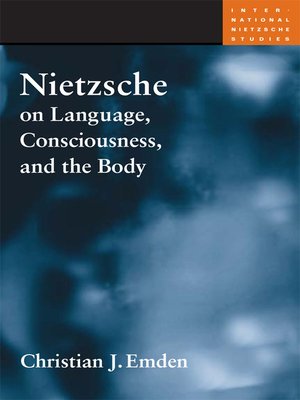Nietzsche on Language, Consciousness, and the Body
ebook ∣ International Nietzsche Studies
By Christian J. Emden

Sign up to save your library
With an OverDrive account, you can save your favorite libraries for at-a-glance information about availability. Find out more about OverDrive accounts.
Find this title in Libby, the library reading app by OverDrive.



Search for a digital library with this title
Title found at these libraries:
| Library Name | Distance |
|---|---|
| Loading... |
Nietzsche and the philosopy of language have been a well trafficked crossroads for a generation, but almost always as a checkpoint for post-modernism and its critics. This work takes a historical approach to Nietzsche's work on language, connecting it to his predecessors and contemporaries rather than his successors. Though Nietzsche invited identification with Zarathustra, the solitary wanderer ahead of his time, for most of his career he directly engaged the intellectual currents and scientific debates of his time.
Emden situates Nietzsche's writings on language and rhetoric within their wider historical context. He demonstrates that Nietzsche is not as radical in his thinking as has been often supposed, and that a number of problems with Nietzsche disappear when Nietzsche's works are compared to works on the same subjects by writers of the 18th and 19th centuries. Further, the relevance of rhetoric and the history of rhetoric to philosophy and the history of philosophy is reasserted, in consonance with Nietzsche's own statements and practices. Important in this regard are the role of fictions, descriptions, and metaphor.
| Contents Acknowledgments Abbreviations and Translations Introduction 1. The Irreducibility of Language: The History of Rhetoric in the Age of Typewriters 2. The Failures of Empiricism: Language, Science, and the Philosophical Tradition 3. What Is a Trope? The Discourse of Metaphor and the Language of the Body 4. The Nervous Systems of Modern Consciousness: Metaphor, Physiology, and Mind 5. Interpretation and Life: Outlines of an Anthropology of Knowledge Notes Select Bibliography 6 Index | "An intriguing and engaging read."—Journal of Japanese Studies
"Skillfully unravels Japan's intricate domestic politics of emigration to Latin America before and after WW II."—Enterprise & Society
|Christian J. Emden is an assistant professor of German studies at Rice University.
Emden situates Nietzsche's writings on language and rhetoric within their wider historical context. He demonstrates that Nietzsche is not as radical in his thinking as has been often supposed, and that a number of problems with Nietzsche disappear when Nietzsche's works are compared to works on the same subjects by writers of the 18th and 19th centuries. Further, the relevance of rhetoric and the history of rhetoric to philosophy and the history of philosophy is reasserted, in consonance with Nietzsche's own statements and practices. Important in this regard are the role of fictions, descriptions, and metaphor.
| Contents Acknowledgments Abbreviations and Translations Introduction 1. The Irreducibility of Language: The History of Rhetoric in the Age of Typewriters 2. The Failures of Empiricism: Language, Science, and the Philosophical Tradition 3. What Is a Trope? The Discourse of Metaphor and the Language of the Body 4. The Nervous Systems of Modern Consciousness: Metaphor, Physiology, and Mind 5. Interpretation and Life: Outlines of an Anthropology of Knowledge Notes Select Bibliography 6 Index | "An intriguing and engaging read."—Journal of Japanese Studies
"Skillfully unravels Japan's intricate domestic politics of emigration to Latin America before and after WW II."—Enterprise & Society
|Christian J. Emden is an assistant professor of German studies at Rice University.







